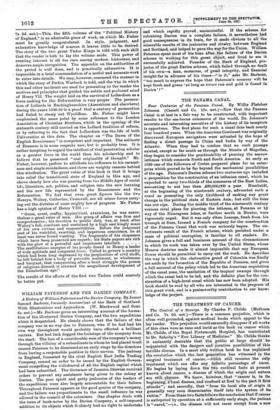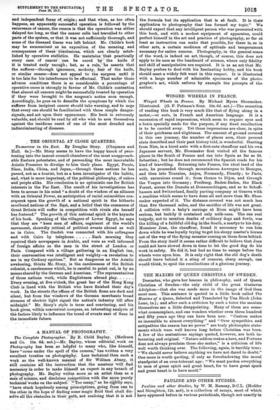THE TREATMENT OF CANCER.
The Control, of a Scourge. By Charles P. Child°. (Methuen
•
and Co. 7s. 6d. net.)—There is a common prejudice, , which is often well grounded, against medical books which appeal to the lay reader. This prejudice would assuredly disappear if all works of this class were as sane and lucid an the book on cancer which Mr. Childe, of the Royal Portsmouth Hospital, has contributed to Dr.' &dashes "New Library of Medicine." Mr. Child's thinks it eminently desirable that the public at largo Should' be. acquainted with the dangers and curative possibilities of' this terrible disease. In a most ably written book he has explained the revelution Which the last generation has witnessed in the surgical treatment of ..cancer,—Which still. remains the ' MAY treatment which. can offer any , definite percentage of cures. Ho begins by laying down the two cardinal facts at present known about dancer, a disease of ...Which the origin and nature . are etill,l)bsCare. We know, however ; that " Cancer is in its beginning, iehocal disease, and confined at first to the part it first attacks"; and secondly, that "from its local site of Origin it generally very soon 'disseminates itself into the system of its victim," Fran there two &eta follows the conclusion that if cancer is extirpated by operation at a sufficiently early stage, the patient is "cured,"—i.e., the disease will not recur except from a new and independent focus of. origin ; and that when, as too often happens, an apparently successful operation is followed by the recurrence Of Cancer, the reason is that the operation was either delayed too long, so that the cancer cells had travelled to other parts of the system, or that it was not sufficiently thorough, and some of the diseased tissue was left behind. Mr. Childe's book may be summarised as an exposition of the meaning. and consequences of these 'Crinclusions, which are clearly estab- lished by operative statistics. He maintains :that practically every case of cancer can be cured by the knife if it is treated early enough ; but, as a ride,Ale asserts that the sufferer—through ignorance, modesty, fear of the knife, or similar causes—does not appeal to the surgeon until it is too late' for his interference to be effectual.' That under these adverse conditions there. a so considerable a percentage of operative cures is strongly in favcinr of Mr. Childe's contention that almost all cancers might be successfully treated by operation if they were brought to the surgeon's notice soon enough. Accordingly, he goes on to describe the symptoms by which the sufferer from incipient cancer should take warning, and to urge that every one should be familiarised with these simple danger. signals, and act upon their appearance. His book is extremely valuable, and should be read by all who wish to arm themselves against the insidious onset of one of the most dreaded and indiscriminating of diseases.

















































 Previous page
Previous page